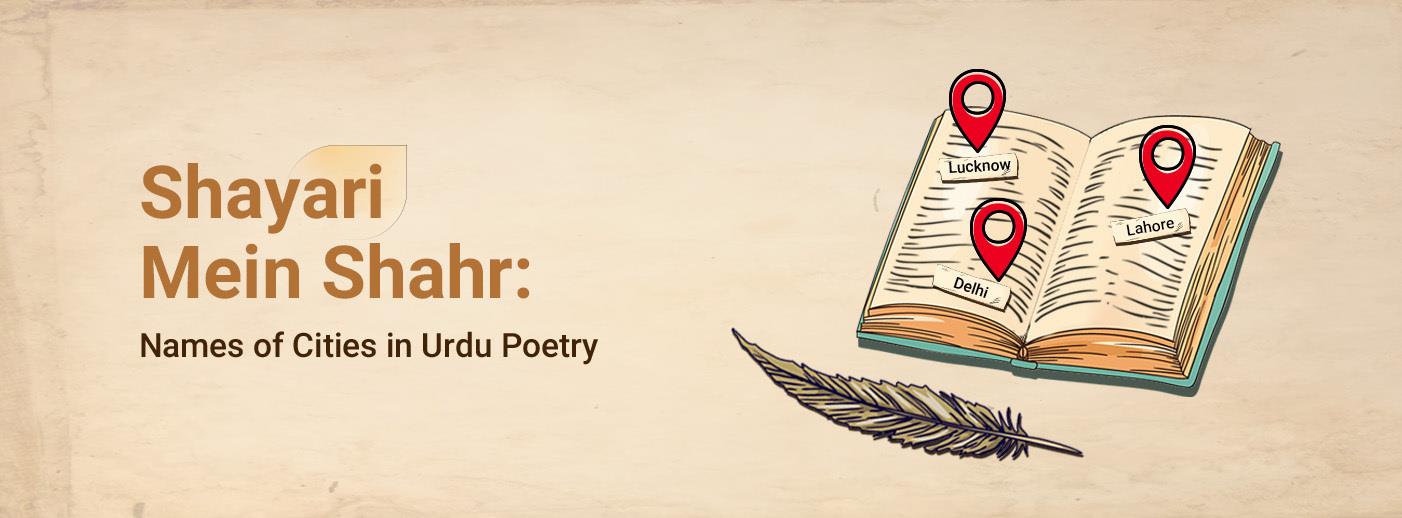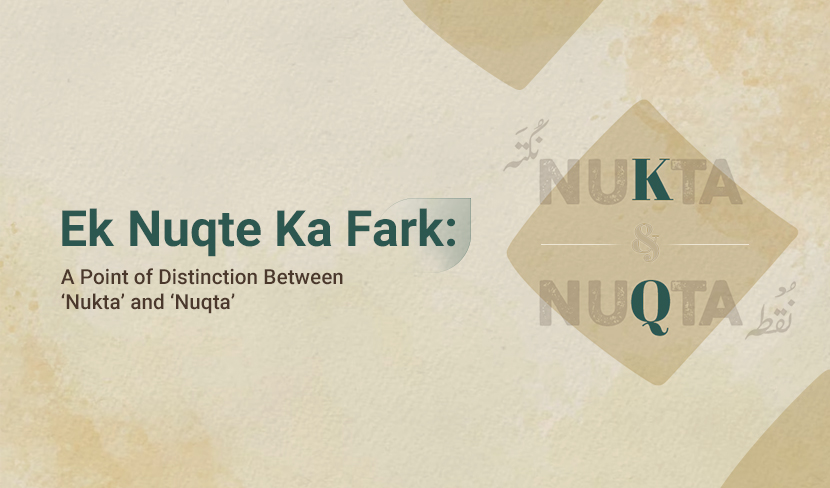Top searched
Saved words
khisyaanii billii khambaa noche
an embarrassed or ashamed person tends to vent his/her feeling by quarrelling
be-niyaaz
without want, free from want, wanting nothing, not in need, able to dispense, independent, carefree
Shayari Mein Shahr: Names of Cities in Urdu Poetry

Hello, dear readers! Get ready to dive into the captivating world of Urdu poetry, where cities step into the limelight and tell their captivating stories through the elegant art of shayari.
In this enchanting realm of shayari, poets have an uncanny knack for weaving the names of (shahr) cities right into the fabric of their verses. It is through these verses that we witness the profound attachment and love that poets harbor for the cities they call home. One such poem boasting the representation of city life through its lyrical magic is Akbar Allahabadi’s ‘Jalwa-e-Darbaar-e-Dehli’. You can read it here.
But that’s not all. Urdu poetry isn't content with merely painting pretty pictures of cities. It delves deeper into the intricate layers of urban and country life, capturing the diverse shades within. These verses don't just adorn the page; they come alive with the vibrancy of bustling markets, the echoes of history resonating through ancient streets, and the subtle aroma of traditions passed down through generations. They also unpack the political dynamics, dissect the societal shifts, and even document the rise of literature and culture within city walls.
So let’s explore the interplay of city names within Urdu verses, encompassing all that we've touched upon and even beyond. We’ll figure out just how artfully these couplets enfold entire cities within their succinct lines. It's a tapestry of poetic prowess that awaits!
On Delhi:
Our starting point is a qita often attributed to Mir. Within its verses, he portrays the decline of the Delhi empire. With poignant eloquence, the poet reminisces about a time when Delhi was a thriving hub of livelihood seekers. Yet, now it seems to be fading, losing its former vitality. The qita encapsulates this sentiment:
kyā būd-o-bāsh pūchho ho pūrab ke sākino
ham ko ġharīb jaan ke hañs hañs pukār ke
dillī jo ek shahr thā aalam meñ intiḳhāb
rahte the muntaḳhab hī jahāñ rozgār ke
us ko falak ne luuT ke barbād kar diyā
ham rahne vaale haiñ usī ujḌe dayār ke
In another couplet, Mir slyly pokes at the self-absorbed emperors of the Delhi empire. He hints that their neglect of the city led to a loss of reputation, status, and riches to external forces.
dillii me.n aaj bhiik bhii miltii nahii.n unhe.n
thaa kal talak dimaaG jinhe.n taaj-o-taKHt kaa
In a couplet penned by the last Mughal emperor, Bahadur Shah Zafar, we can see how he expresses his sorrow over losing his empire:
ai vaa.e inqalaab zamaane ke jaur se
dillii 'zafar' ke haath se pal me.n nikal ga.ii
Jaan Nisar Akhtar comments on how the once vibrant Delhi lost its charm and hustle-bustle in the following couplet:
dillii kahaa.n ga.ii.n tire kuucho.n kii raunaqe.n
galiyo.n se sar jhukaa ke guzarne lagaa huu.n mai.n
On Lucknow:
Lucknow extended its gracious embrace to poets as much as Delhi did. And hence, the poets’ attachment to the city of Nawabs is quite evident.
Take a look at this couplet by Mirza Hadi Ruswa, who describes how both these cities dear to him, were brought to a political downfall:
dillī chhuTī thī pahle ab lucknow bhī chhoḌeñ
do shahar the ye apne donoñ tabāh nikle
Yagana Changezi takes a playful route to shed light on the vibrant existence within Lucknow, especially in the market lanes of Aminabad:
kashish-e-lucknow are tauba
phir vahii ham vahii amiinaabaad
Bismil Saeedi employs the poignant style of poetic lamentation to draw a parallel between the unforgiving nature of Delhi and Lucknow. Within this couplet, Lucknow appears to come out on top, in this subtle poetic contest:
kiyaa tabaah to dillii ne bhii bahut 'bismil'
magar KHudaa kii qasam lucknow ne luuT liyaa
On Lahore:
Akbar Allahabadi, famous for his satirical verse, cleverly poked at political tensions. He once sent mangoes from Allahabad to Iqbal in Lahore. Surprised by the smooth delivery, Akbar penned a couplet highlighting the unimpeded journey as a subtle commentary:
asar ye tere anfās-e-masīhā.ī kā hai 'akbar'
allahabad se lañgDā chalā lahore tak pahuñchā
Fakhr Abbas’ playful couplet, takes the support of the city of Lahore to depict how a lovers' fascination with a city can sprout from the mere presence of a beloved:
ye jo lahore se mohabbat hai
ye kisii aur se mohabbat hai
As you've witnessed, city names have been the steadfast companions of poets, guiding their brushes across the canvas of political, satirical, and romantic landscapes. It's indeed a realm of its own!
And with this, we will call it a day. Stay tuned with us, as we promise to continue embarking on more such captivating journeys. Until then, humse aur in shahro.n se raabta qaayam rakhiye!
Delete 44 saved words?
Do you really want to delete these records? This process cannot be undone





